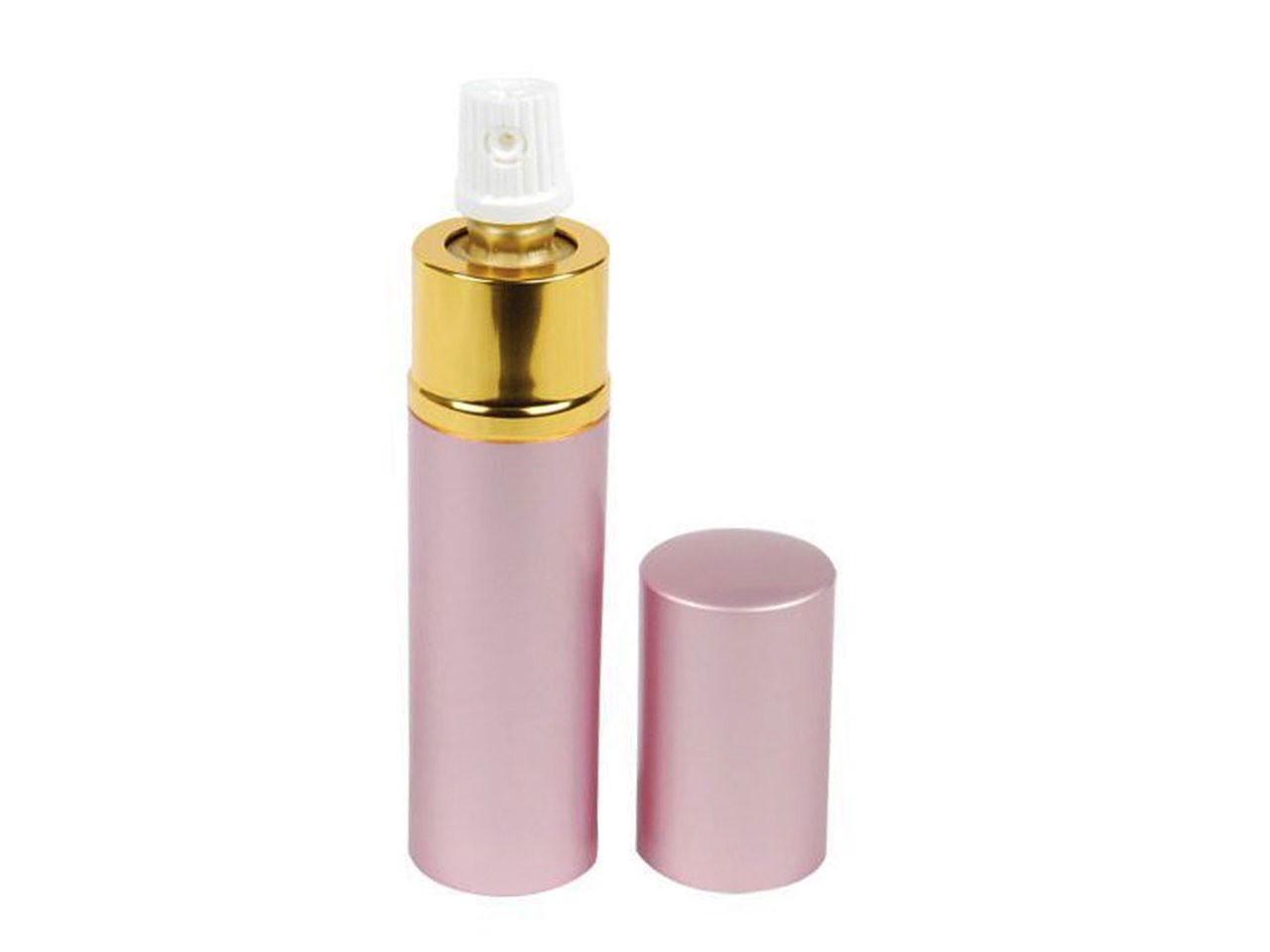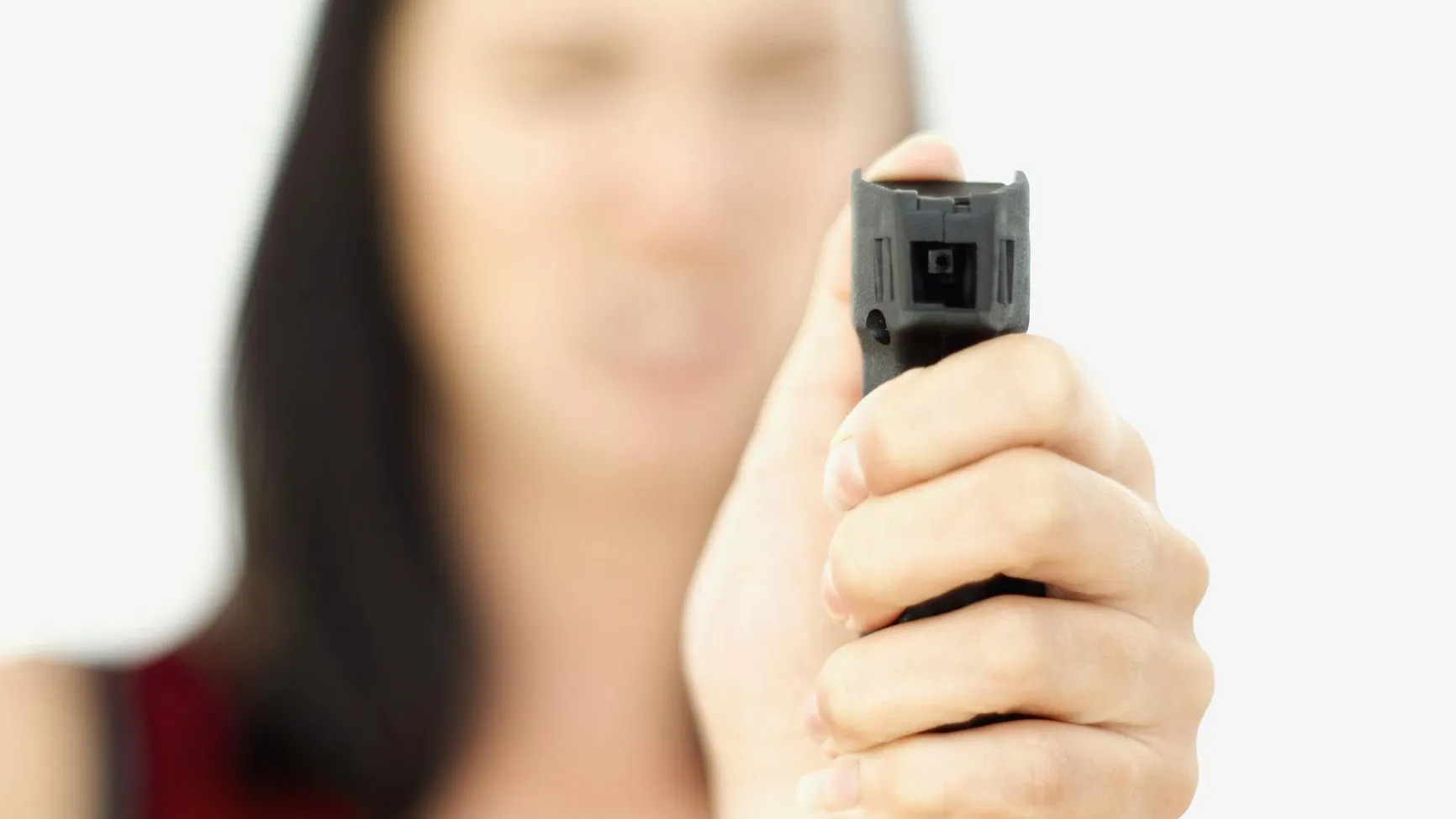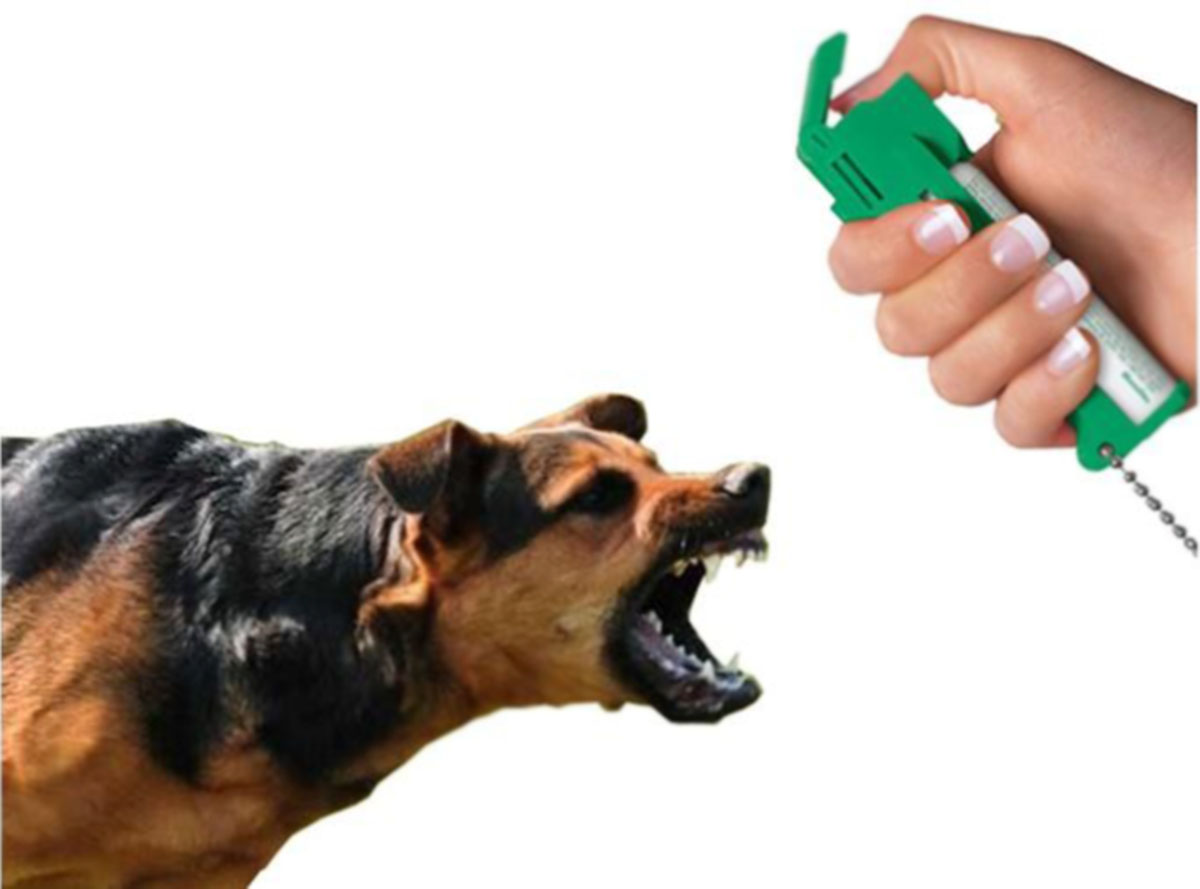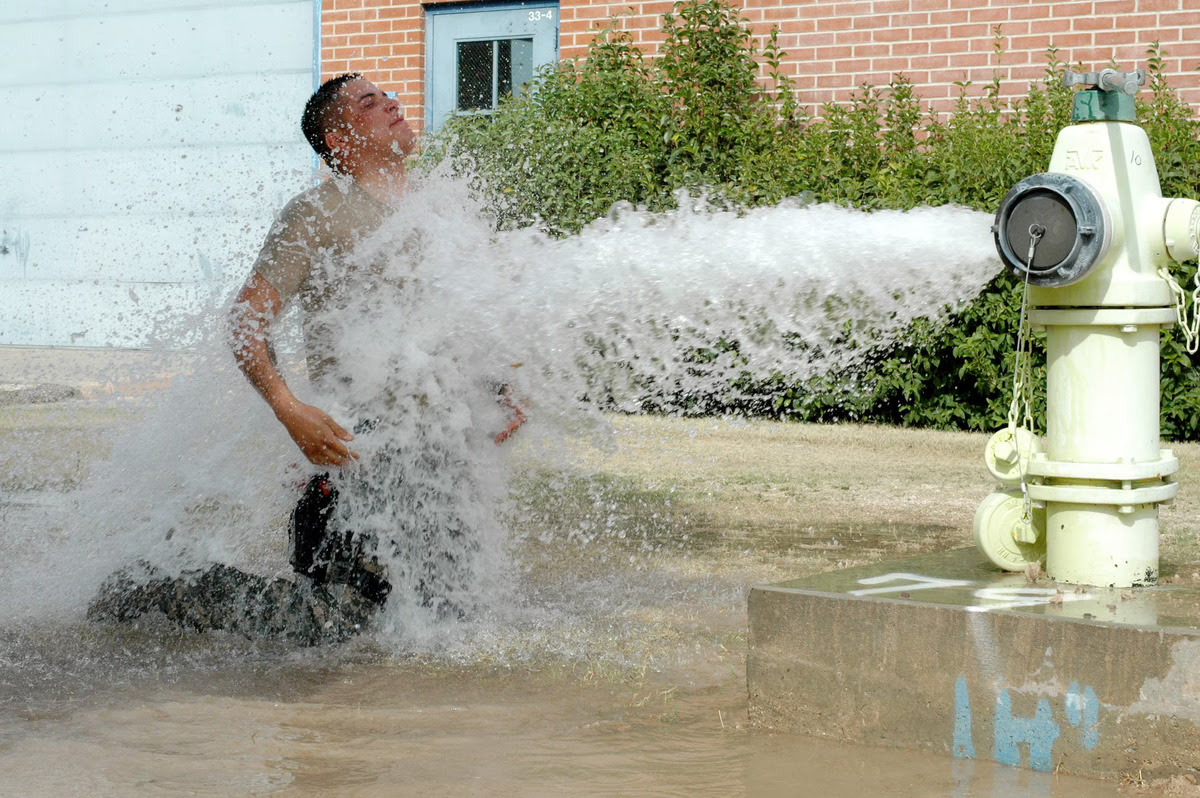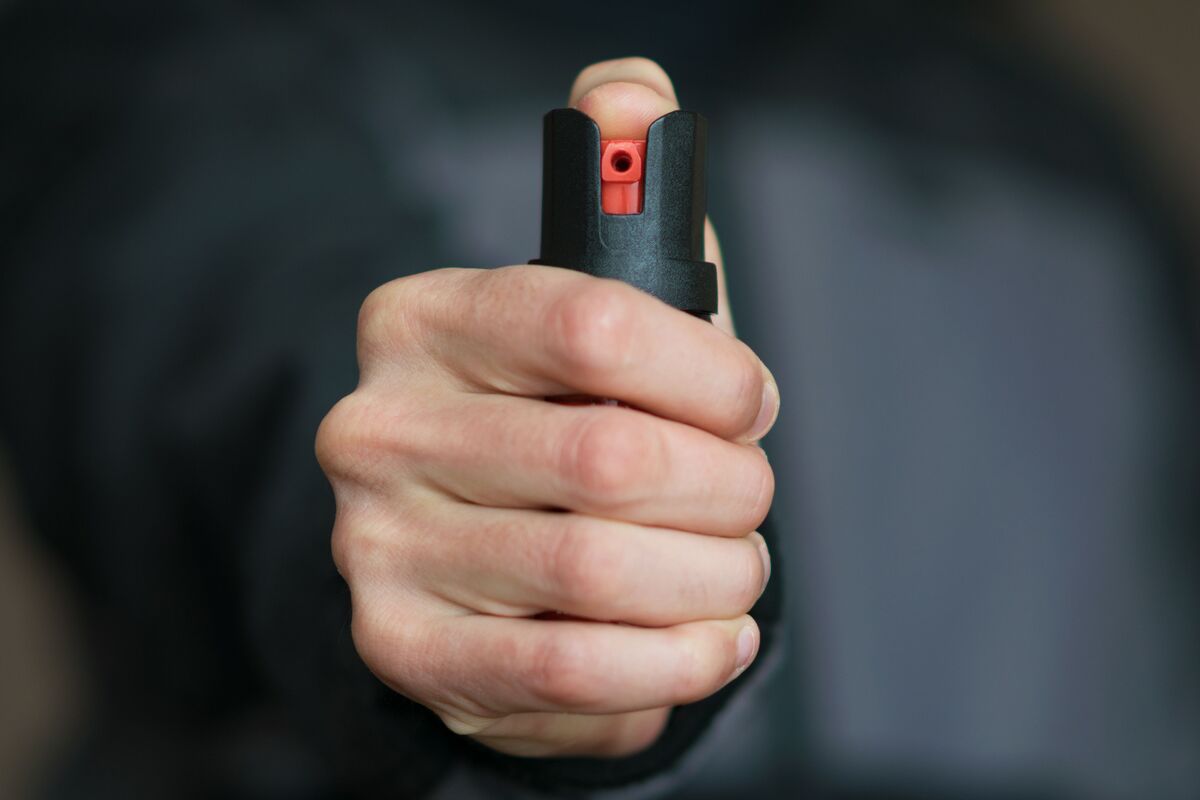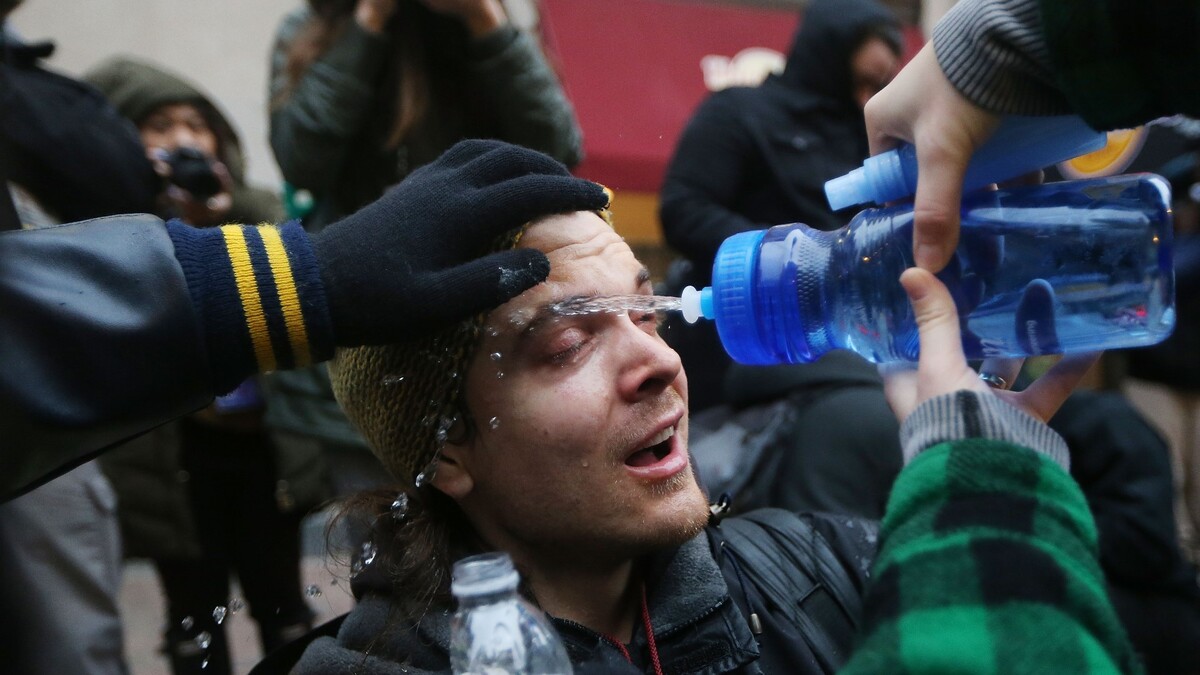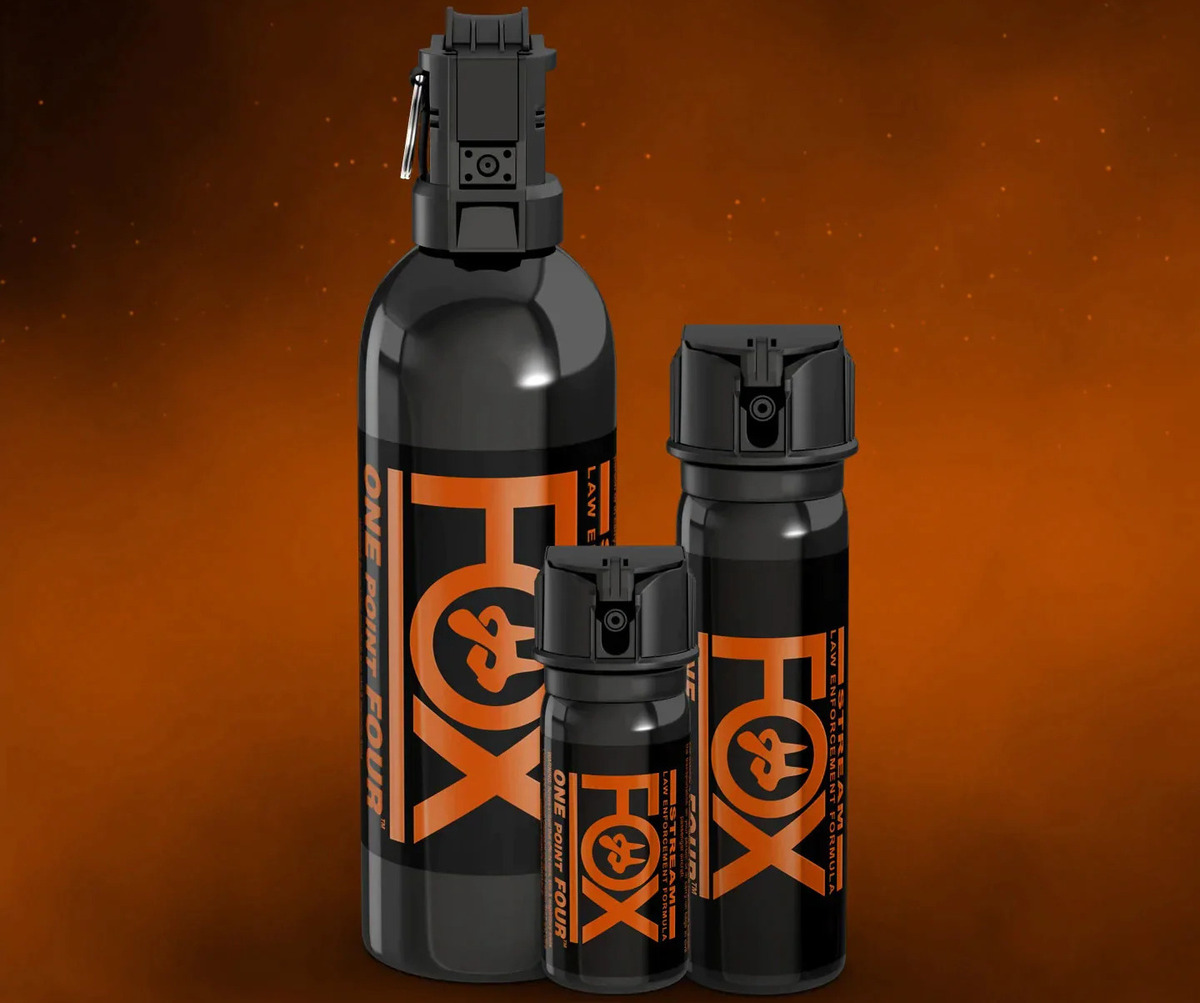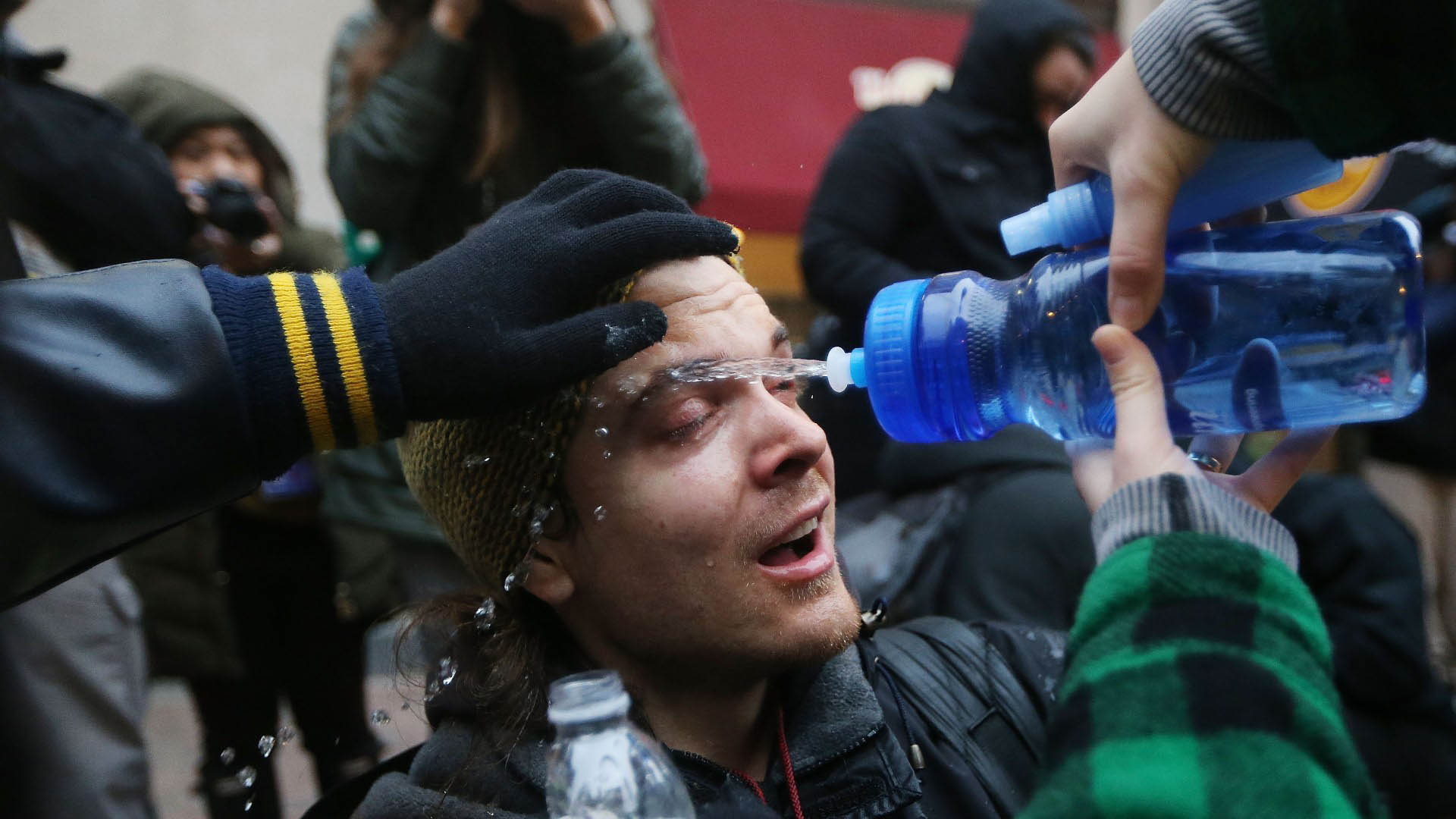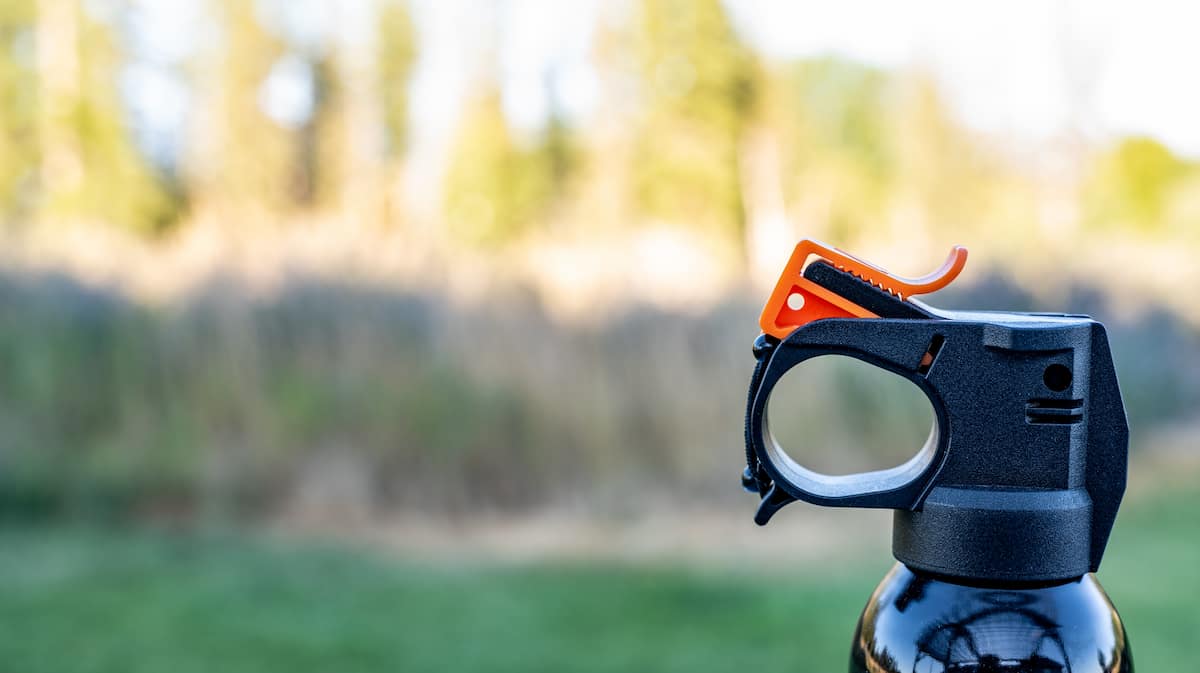Home>Home Security and Surveillance>What Happens If You Get Pepper Spray In Your Mouth
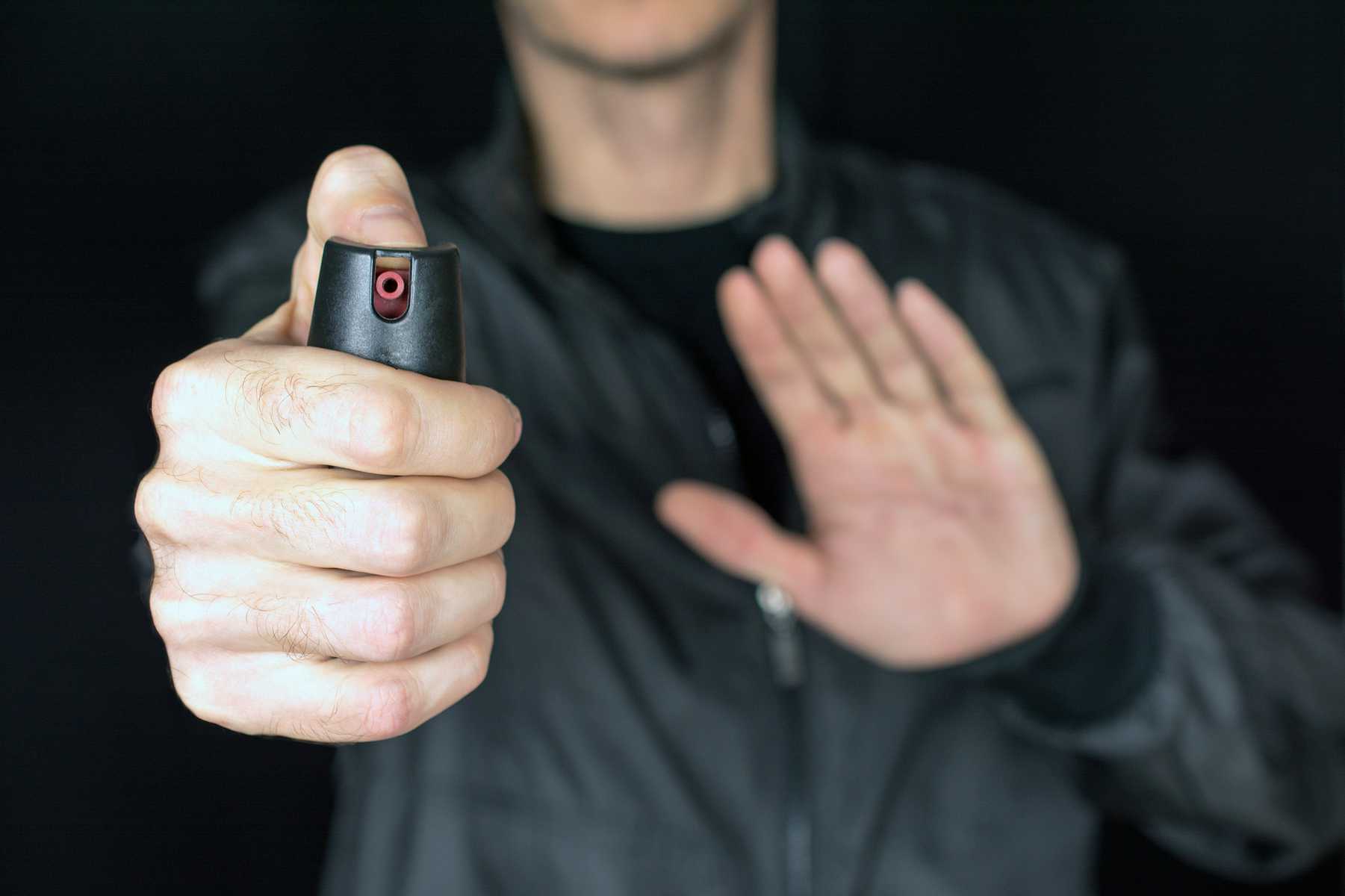

Home Security and Surveillance
What Happens If You Get Pepper Spray In Your Mouth
Modified: March 24, 2024
Discover what happens when pepper spray comes into contact with your mouth. Learn how to stay safe and protect your home security and surveillance.
(Many of the links in this article redirect to a specific reviewed product. Your purchase of these products through affiliate links helps to generate commission for Storables.com, at no extra cost. Learn more)
Introduction
Pepper spray is a popular self-defense tool that is widely used by individuals to protect themselves from potential threats. It is a non-lethal weapon that contains an active ingredient called capsaicin, a chemical derived from chili peppers. When sprayed in the face, it causes intense pain, temporary blindness, and disorientation, giving the person being attacked a chance to escape.
The use of pepper spray has gained popularity because of its effectiveness and ease of use. However, there are some potential dangers associated with its use, especially if it accidentally gets in the mouth. In this article, we will explore what happens if you get pepper spray in your mouth, the immediate and long-term effects, and what steps to take to mitigate the situation.
Pepper spray works by irritating the mucous membranes of the eyes, nose, and throat, causing intense pain, inflammation, and temporary impairment of vision. It is typically sprayed in a fine mist or stream, allowing it to reach its target effectively. While it is primarily designed for use on the face, accidental exposure to the mouth can occur in certain situations.
Accidental exposure to pepper spray in the mouth can happen if a person accidentally inhales or swallows the spray, or if the spray comes into contact with the mouth during self-defense actions. This can occur during a struggle with an attacker or unintentionally while trying to deploy the pepper spray.
The immediate effects of pepper spray in the mouth are intense burning pain, difficulty breathing or coughing, excessive salivation, and a sensation of heat. The capsaicin in the spray stimulates the nerve endings in the mouth and throat, causing these symptoms. It can also lead to temporary impairment of speech and swallowing, making it difficult to communicate or seek immediate help.
Key Takeaways:
- Accidentally getting pepper spray in your mouth can cause intense burning, difficulty breathing, and excessive salivation. Rinsing with a milk-based product can help alleviate the discomfort.
- Seek medical attention if you experience severe or prolonged symptoms, allergic reactions, eye irritation, respiratory distress, or have pre-existing medical conditions. Prioritize your well-being and follow proper first aid measures.
How Pepper Spray Works
Pepper spray, also known as OC spray (oleoresin capsicum), is formulated to incapacitate attackers by causing severe irritation to their sensory systems. It is typically made with a combination of capsaicin, a powerful irritant derived from chili peppers, and a propellant to help disperse the spray effectively. Let’s take a closer look at how pepper spray works.
When pepper spray is sprayed in the face, it primarily targets the eyes, nose, and throat, which are the most sensitive areas of the human body. The capsaicin in the spray binds to the receptors on the nerve endings, causing a burning sensation and intense pain. It also stimulates tears, mucus production, and coughing, which can further incapacitate the attacker.
The inflammatory effects of pepper spray are instantaneous and temporary. They include redness, swelling, and excessive tearing of the eyes, runny nose, coughing, and even temporary blindness. These effects are the body’s natural response to the irritation caused by the capsaicin in the spray. Additionally, the intense pain and discomfort can cause disorientation and a temporary loss of motor coordination, giving the person being sprayed a chance to escape from the threat.
The capsaicin in pepper spray works by directly affecting the pain receptors in the face and triggering a response from the body’s sensory system. It does not cause any long-term damage or lasting harm, but the effects can be extremely unpleasant and distressing in the short term.
It’s important to note that different types of pepper sprays may have varying concentrations of capsaicin, affecting the intensity and duration of the effects. Some sprays contain a higher concentration of capsaicin, making them more potent and effective, but also potentially more painful. It is crucial to check the strength of the pepper spray and follow the manufacturer’s instructions for proper usage.
Overall, pepper spray is a valuable self-defense tool that can provide a level of protection in potentially dangerous situations. Understanding how it works can help users make informed decisions when purchasing and deploying pepper spray, ensuring they are prepared to protect themselves effectively.
Potential Dangers of Pepper Spray
While pepper spray is widely regarded as a safe and effective self-defense tool, it is essential to be aware of its potential dangers and use it responsibly. Understanding the risks associated with pepper spray can help users make informed decisions and mitigate any potential harm. Let’s explore some of the potential dangers of pepper spray.
1. Side Effects: When pepper spray is used, it can cause intense pain, temporary blindness, and difficulty breathing. These effects are intended to incapacitate an attacker, but they can also affect the user and innocent bystanders if not used properly. If the spray accidentally comes into contact with the eyes, nose, or mouth of the user, it can cause significant discomfort and even temporary impairment.
2. Allergic Reactions: Some individuals may have an allergic reaction to the capsaicin in pepper spray. Symptoms of an allergic reaction can include swelling, redness, hives, difficulty breathing, and in severe cases, anaphylaxis. It is important for users to be aware of any underlying allergies or sensitivities they may have before using pepper spray.
3. Cross-Contamination: If pepper spray is used in a crowded area or during a physical altercation, there is a risk of cross-contamination. This means that innocent bystanders or individuals nearby may inadvertently inhale or come into contact with the spray, leading to discomfort and potentially adverse effects. It is crucial to use pepper spray in a controlled environment to minimize the risk of cross-contamination.
4. Misuse or Accidental Discharge: Mishandling or accidental discharge of pepper spray can lead to unintended consequences. It is essential to follow the manufacturer’s instructions and practice proper handling techniques to avoid accidentally spraying yourself or others. Additionally, using pepper spray in inappropriate or non-self-defense situations can lead to legal consequences.
5. Resistance or Tolerance: Some individuals may develop a tolerance or resistance to the effects of pepper spray over time. This can occur with prolonged exposure or repeated use. It is important to remember that while pepper spray can be an effective tool, it may not guarantee incapacitation if the person being sprayed has developed such a tolerance.
To minimize these potential dangers, it is crucial to use pepper spray responsibly and within the bounds of the law. Familiarize yourself with the local regulations regarding its possession and usage, and only deploy pepper spray in situations where there is an imminent threat to personal safety.
Remember, self-defense should always be a last resort, and seeking professional help or guidance should be the priority whenever possible. Being informed and educated about the potential risks and dangers of pepper spray will enable users to make informed decisions and enhance personal safety effectively.
Accidental Exposure to Pepper Spray in the Mouth
While pepper spray is primarily designed for use on the face, accidental exposure to the mouth can occur in certain situations. Accidental exposure can happen if a person accidentally inhales or swallows the spray, or if the spray comes into direct contact with the mouth during self-defense actions. Let’s take a closer look at what happens when there is accidental exposure to pepper spray in the mouth and its potential consequences.
Accidental exposure to pepper spray in the mouth can occur during a struggle with an attacker or unintentionally while trying to deploy the pepper spray. In high-stress situations, it is possible for the spray to accidentally enter the person’s mouth or be inhaled. This can be a distressing experience, as the mouth is highly sensitive to the capsaicin, the active ingredient in pepper spray.
The immediate effects of pepper spray in the mouth can be intense and unpleasant. The capsaicin stimulates the nerve endings in the mouth and throat, causing a sensation of intense burning pain, difficulty breathing or coughing, excessive salivation, and a feeling of heat. The person may experience temporary impairment of speech and swallowing, making it difficult to communicate or seek immediate help.
It is important to note that accidental exposure to pepper spray in the mouth does not typically cause any serious long-term effects or permanent damage. However, the immediate discomfort and pain can be significant. The effects may last for several hours, and individuals may experience residual effects such as a lingering burning sensation, irritation, or soreness in the mouth area.
If you accidentally get pepper spray in your mouth, the first instinct may be to rinse your mouth with water. However, this may not provide immediate relief, as capsaicin is not water-soluble. Instead, it is recommended to rinse the mouth with a milk-based product, such as milk or yogurt, as the fat content in these products can help neutralize the capsaicin and alleviate the burning sensation.
It is essential to avoid touching or rubbing the affected areas, as this can spread the capsaicin and worsen the discomfort. Additionally, it is important to avoid drinking alcohol or eating spicy foods, as these can further irritate the mouth and throat.
In the event of accidental exposure to pepper spray in the mouth, it is advisable to seek fresh air and move away from the source of the spray to minimize further inhalation. If symptoms persist or worsen, it is recommended to seek medical attention for proper evaluation and treatment.
Remember, accidental exposure to pepper spray in the mouth is a distressing experience, but with proper care and treatment, the effects are typically temporary. It is essential to handle pepper spray with caution and always follow the manufacturer’s instructions to minimize the risk of accidental exposure.
Immediate Effects of Pepper Spray in the Mouth
The immediate effects of pepper spray in the mouth can be extremely uncomfortable and distressing. When pepper spray comes into contact with the sensitive tissues of the mouth, it stimulates the nerve endings and causes a range of immediate effects. Let’s explore the immediate effects of pepper spray in the mouth in more detail.
1. Intense Burning Sensation: The capsaicin, the active ingredient in pepper spray, immediately triggers a sensation of intense burning in the mouth. It can be described as a fiery, searing pain that affects the entire oral cavity, including the tongue, gums, and throat.
2. Difficulty Breathing and Coughing: Pepper spray in the mouth can make breathing difficult. It causes irritation to the respiratory tract, leading to coughing, wheezing, and shortness of breath. This can be especially distressing and can be accompanied by a feeling of suffocation.
3. Excessive Salivation: Pepper spray can also stimulate the salivary glands, causing an increase in saliva production. The person may experience a profuse amount of saliva in the mouth, leading to drooling and a constant need to spit.
4. Heat Sensation: The capsaicin in pepper spray creates a sensation of heat in the mouth. It can feel as if the mouth is on fire, contributing to the overall discomfort and pain experienced.
5. Impaired Speech and Swallowing: The intense pain and discomfort from the pepper spray can temporarily impair a person’s ability to speak and swallow. They may have difficulty forming words or articulating properly. Swallowing may also be challenging due to the extreme discomfort and the urge to avoid aggravating the affected areas.
6. Tears and Runny Nose: Although the eyes and nose are not directly affected when pepper spray is in the mouth, there can still be a reflex response. Tears may stream down the face, and the nose may start to run excessively due to the body’s automatic reaction to the irritation.
It is important to note that the immediate effects of pepper spray in the mouth are typically temporary and should subside over time. However, the duration and severity of the effects can vary depending on the individual and the concentration of the spray. It is essential to remain calm and avoid further aggravating the affected areas.
If you find yourself with pepper spray in your mouth, it is important to rinse your mouth with a milk-based product like milk or yogurt. The fat content in these products can help neutralize the capsaicin and alleviate the burning sensation. Avoid using water, as capsaicin is not water-soluble and may not provide immediate relief.
Remember, the immediate effects of pepper spray in the mouth can be distressing, but they are typically temporary. If symptoms persist or worsen, it is advisable to seek medical attention for proper evaluation and management.
If you accidentally get pepper spray in your mouth, rinse your mouth with cold water and milk to help ease the burning sensation. Avoid hot water or any spicy foods.
Long-term Effects of Pepper Spray in the Mouth
When pepper spray comes into contact with the sensitive tissues of the mouth, it can cause immediate discomfort and pain. However, the long-term effects of pepper spray in the mouth are generally minimal and unlikely to cause any lasting harm. Let’s take a closer look at the long-term effects of pepper spray in the mouth.
1. Temporary Discomfort: The most common long-term effect of pepper spray in the mouth is lingering discomfort. Even after the initial burning sensation subsides, the tissues in the mouth may remain sensitive for some time. This can result in a lingering sensation of irritation, soreness, or mild pain. However, these symptoms gradually fade away as the tissues heal.
2. Transient Loss of Taste: In some cases, individuals may experience a temporary loss of taste following exposure to pepper spray in the mouth. The capsaicin present in the spray can temporarily dull the taste buds, making it difficult to fully experience the flavors of food. However, this loss of taste is typically short-lived and reversible.
3. Psychological Effects: Experiencing the intense pain and discomfort of pepper spray in the mouth can have psychological effects on individuals. It may lead to feelings of anxiety, fear, or trauma associated with the incident. However, these psychological effects are individual-specific and may vary in severity and duration.
It is important to note that the long-term effects of pepper spray in the mouth are generally mild and temporary. The tissues in the mouth have a remarkable ability to heal and recover relatively quickly. Most individuals will experience resolution of symptoms within a few days to a week following exposure.
To aid in the healing process and alleviate discomfort, it is recommended to practice good oral hygiene. This includes gently rinsing the mouth with water or a mild saltwater solution to promote healing and prevent infection. Avoiding spicy or acidic foods and drinks for a few days can also help prevent further irritation to the already sensitive tissues.
If you are concerned about the long-term effects of pepper spray in your mouth or if symptoms persist or worsen over time, it is advisable to seek medical attention for a proper evaluation. A healthcare professional will be able to provide suitable guidance and recommendations based on your specific situation.
Remember, while the immediate effects of pepper spray in the mouth can be distressing, the long-term effects are generally minimal. With proper care and time, the mouth will heal, and any lingering discomfort will subside. Always use pepper spray responsibly and be prepared to handle the potential risks and effects associated with its use.
First Aid and Treatment for Pepper Spray Exposure in the Mouth
If you find yourself in the unfortunate situation of accidental exposure to pepper spray in the mouth, it is important to take immediate steps to alleviate the discomfort and minimize the effects. Here are some first aid measures and treatments to consider for pepper spray exposure in the mouth:
1. Rinse with a Milk-Based Product: One of the first things you can do is rinse your mouth with a milk-based product such as milk or yogurt. The fat content in these products can help neutralize the capsaicin, the active ingredient in pepper spray, and provide relief from the burning sensation. Swish the milk or yogurt around in your mouth for a few minutes before spitting it out. Avoid swallowing the mixture.
2. Avoid Water: Although it may be tempting to rinse your mouth with water, it is not recommended. Capsaicin is not water-soluble, which means that rinsing with water alone may not provide immediate relief and could potentially spread the capsaicin further.
3. Do not Touch or Rub the Affected Areas: It is important to resist the urge to touch or rub the areas of the mouth that have been exposed to pepper spray. This can spread the capsaicin and worsen the discomfort. Instead, try to keep your mouth still and avoid any unnecessary stimulation of the affected areas.
4. Maintain Airflow: Seek fresh air and move away from the source of the spray to minimize further inhalation. Breathing in fresh air can help alleviate any respiratory discomfort and reduce the feeling of suffocation that may be associated with exposure to pepper spray in the mouth.
5. Use Saline Solution for Eye Irritation: If the pepper spray has accidentally entered your eyes during the exposure, rinse your eyes with a sterile saline solution or clean water for at least 15 minutes. It is important to keep your eyes open while rinsing to ensure thorough cleansing.
6. Over-the-Counter Pain Relievers: If you are experiencing pain or inflammation, you may consider taking over-the-counter pain relievers such as ibuprofen or acetaminophen. These medications can help alleviate discomfort, but it is important to follow the recommended dosage and consult a healthcare professional if needed.
7. Seek Medical Attention if Symptoms Persist: While the immediate effects of pepper spray exposure in the mouth are typically temporary, if symptoms persist, worsen, or if you experience any severe reactions, it is advisable to seek medical attention. A healthcare professional will be able to provide appropriate evaluation, guidance, and treatment if necessary.
It is essential to remember that everyone may react differently to pepper spray exposure, and individual responses may vary. If you have pre-existing medical conditions or allergies, it is especially important to seek medical advice to ensure proper management.
Always keep in mind that prevention is better than cure. It is crucial to handle pepper spray with care, understand the proper usage techniques, and deploy it responsibly to minimize the risk of accidental exposure to the mouth or any other sensitive areas.
Lastly, following the incident, take care of yourself both physically and mentally. Engage in practices that help you relax, and reach out for support if needed.
When to Seek Medical Attention
While the immediate effects of pepper spray exposure in the mouth are generally temporary and resolve on their own, there are certain situations where it is important to seek medical attention. If you experience any of the following, it is advisable to seek professional evaluation and treatment:
1. Severe or Prolonged Symptoms: If you are experiencing severe pain, significant difficulty breathing, or persistent symptoms that do not improve over time, it is important to seek medical attention. A healthcare professional can assess your condition and provide appropriate treatment to alleviate your discomfort.
2. Allergic Reactions: If you have a known allergy to capsaicin or any other ingredient in pepper spray, and you develop allergic symptoms such as swelling of the lips, tongue, or throat, hives, difficulty breathing, or dizziness, it is crucial to seek immediate medical attention. Allergic reactions can be serious and require prompt treatment.
3. Eye Irritation: If the pepper spray has entered your eyes during the exposure and you are experiencing severe eye pain, vision changes, or persistent eye redness and swelling, it is important to see an eye specialist. They can evaluate your eyes and provide appropriate treatment to manage any eye-related issues.
4. Respiratory Distress: If you are finding it extremely difficult to breathe, experiencing persistent coughing, wheezing, or a feeling of suffocation, seek immediate medical attention. Severe respiratory distress requires immediate evaluation and treatment to ensure your airway is not compromised.
5. Pre-existing Medical Conditions or Medications: If you have pre-existing medical conditions such as asthma, chronic respiratory conditions, heart conditions, or if you are taking medications that may interact with the pepper spray, it is important to consult a healthcare professional. They can provide specific guidance tailored to your medical history and current medications.
Remember, it is always better to err on the side of caution when it comes to your health. If you have any concerns or doubts about the effects of pepper spray exposure in your mouth, do not hesitate to seek professional medical advice. Healthcare professionals can provide appropriate evaluation, treatment, and guidance based on your individual circumstances.
In the meantime, to manage immediate discomfort, continue to rinse your mouth with a milk-based product, avoid touching or rubbing the affected areas, and maintain access to fresh air. These measures can help alleviate some of the discomfort while you seek medical attention if necessary.
Pepper spray exposure in the mouth can be distressing, but with proper care, treatment, and guidance, the effects are generally manageable and temporary. Prioritize your well-being and seek medical attention as needed to ensure a full and speedy recovery.
Conclusion
Pepper spray is a widely used self-defense tool that can be effective in deterring potential attackers. However, it is crucial to understand the potential risks and dangers associated with its use, especially if it accidentally comes into contact with the mouth. Accidental exposure to pepper spray in the mouth can cause intense discomfort and pain, but the long-term effects are generally minimal and temporary.
When pepper spray gets in the mouth, the immediate effects include intense burning pain, difficulty breathing, excessive salivation, and a sensation of heat. These symptoms can be distressing and may temporarily impair speech and swallowing. However, with proper care and treatment, the effects typically subside over time.
First aid measures for pepper spray exposure in the mouth include rinsing with a milk-based product to alleviate the burning sensation, avoiding water to prevent spreading the capsaicin, and maintaining airflow to minimize respiratory distress. Seeking medical attention is recommended in severe or prolonged cases, cases of allergic reactions, significant eye irritation, respiratory distress, or if there are pre-existing medical conditions or medications that may interact with the pepper spray.
It is important to handle pepper spray responsibly, familiarize yourself with its proper usage techniques, and be aware of local regulations. Prevention and avoidance of accidental exposure to the mouth or other sensitive areas are key. Remember, self-defense should always be a last resort, and seeking professional help or guidance should be prioritized whenever possible.
In conclusion, accidental exposure to pepper spray in the mouth can cause immediate discomfort and pain, but the long-term effects are generally minimal. By understanding the potential risks, following proper first aid measures, and seeking medical attention when necessary, individuals can effectively manage the effects of pepper spray exposure and ensure their well-being.
Frequently Asked Questions about What Happens If You Get Pepper Spray In Your Mouth
Was this page helpful?
At Storables.com, we guarantee accurate and reliable information. Our content, validated by Expert Board Contributors, is crafted following stringent Editorial Policies. We're committed to providing you with well-researched, expert-backed insights for all your informational needs.

